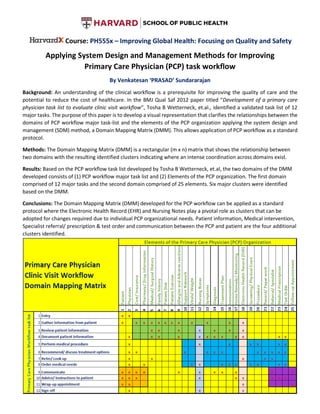HX-PH555x-Applying System Design and Management Methods for Improving PCP Workflow
- 1. Course: PH555x ŌĆō Improving Global Health: Focusing on Quality and Safety Applying System Design and Management Methods for Improving Primary Care Physician (PCP) task workflow By Venkatesan ŌĆśPRASADŌĆÖ Sundararajan Background: An understanding of the clinical workflow is a prerequisite for improving the quality of care and the potential to reduce the cost of healthcare. In the BMJ Qual Saf 2012 paper titled ŌĆ£Development of a primary care physician task list to evaluate clinic visit workflowŌĆØ, Tosha B Wetterneck, et.al., identified a validated task list of 12 major tasks. The purpose of this paper is to develop a visual representation that clarifies the relationships between the domains of PCP workflow major task-list and the elements of the PCP organization applying the system design and management (SDM) method, a Domain Mapping Matrix (DMM). This allows application of PCP workflow as a standard protocol. Methods: The Domain Mapping Matrix (DMM) is a rectangular (m x n) matrix that shows the relationship between two domains with the resulting identified clusters indicating where an intense coordination across domains exist. Results: Based on the PCP workflow task list developed by Tosha B Wetterneck, et.al, the two domains of the DMM developed consists of (1) PCP workflow major task list and (2) Elements of the PCP organization. The first domain comprised of 12 major tasks and the second domain comprised of 25 elements. Six major clusters were identified based on the DMM. Conclusions: The Domain Mapping Matrix (DMM) developed for the PCP workflow can be applied as a standard protocol where the Electronic Health Record (EHR) and Nursing Notes play a pivotal role as clusters that can be adopted for changes required due to individual PCP organizational needs. Patient information, Medical intervention, Specialist referral/ prescription & test order and communication between the PCP and patient are the four additional clusters identified.

